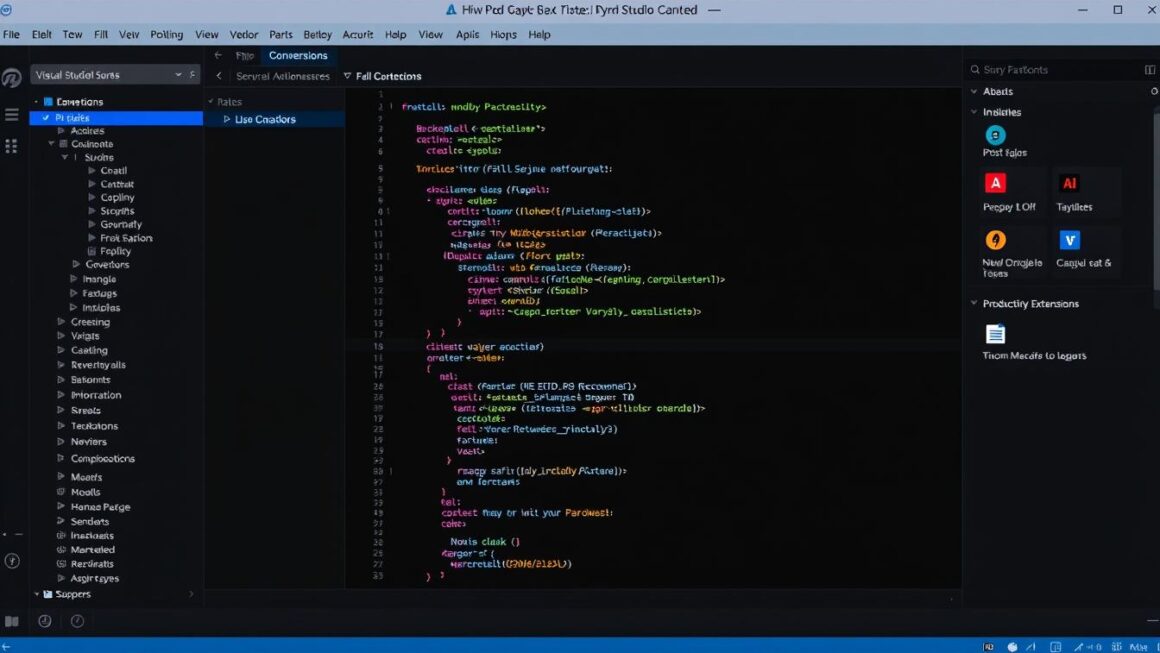Did you know a good weekend learning schedule boosts your learning as a developer? Setting aside time for learning and coding keeps you motivated and focused.
Having a study plan is key to staying on track. The Pomodoro method helps you stay focused. Using these methods in your weekend routine maximizes your time and helps you reach your goals.
A structured plan ensures you learn consistently, which is vital for developer growth. A weekend learning schedule lets you review the week’s learnings, dive into new topics, and work on projects.
The Importance of Structured Weekend Learning for Developers
In the fast-paced world of tech, a well-planned weekend learning schedule can make all the difference. As a developer, staying updated with the latest technologies and trends is key for career growth and staying competitive.
Continuous learning is not just a buzzword; it’s a necessity in the tech industry. The “1% improvement rule” shows that daily practice, even a small amount, can lead to big growth over time. This principle highlights the need for consistent learning, making a structured weekend learning schedule vital for developers.
Why Continuous Learning Matters in Tech
The tech industry is always changing fast. New programming languages, frameworks, and tools come out all the time. It’s essential for developers to keep learning to stay relevant and adaptable in this fast-paced world.
The Weekend Advantage: Focused Time Without Workday Distractions
Weekends offer a unique advantage for learning. Without the distractions and interruptions of weekdays, developers can focus fully on their learning goals. A developer learning schedule that uses this focused time can lead to better learning outcomes.
Building Competitive Skills in a Rapidly Evolving Industry
In a competitive job market, having a well-structured weekend learning schedule can be a big plus. It lets developers get new skills and knowledge, making them more competitive and valuable to their employers or clients.
Assessing Your Learning Needs and Setting Clear Goals
A good weekend study routine starts with knowing yourself and your goals. You need to see where you are and where you want to go.
Conducting a Skills Gap Analysis
Start by checking your skills against what you need for your job or project. This skills gap analysis shows what you need to work on. It helps you learn what’s most important.
Setting SMART Learning Objectives
Once you know what you need to work on, set clear goals. Make them Specific, Measurable, Achievable, Relevant, and Time-bound (SMART). For example, “I will learn to implement a RESTful API using Node.js by the end of the month.”
Prioritizing Technologies Based on Career Goals
Make sure your learning matches your career dreams. If you want to be in data science, focus on learning Python and the right libraries first.
Short-term vs. Long-term Learning Investments
Don’t forget to balance your learning. Focus on what you need now and what will help you later. This way, you stay productive now and prepare for the future.
By doing these steps, you’ll make a developer study plan that fits you. It will make your weekend study routine better and help your career grow.
How I Structure My Weekend Learning Schedule as a Developer
To make the most of your weekend, you’ve set up a plan. This plan balances learning new things and improving what you already know.
My Core Scheduling Philosophy
My main idea is to optimize learning on weekends by setting aside specific times. You should have clear goals for the weekend and break them into smaller tasks.
Balancing Depth vs. Breadth of Learning
Choosing between deep or wide learning is a big challenge. You might focus on one technology deeply or learn a bit about many. It’s important to find a balance. For example, spend one day learning new skills and the next day improving what you already know.
Sample Weekend Schedule Breakdown
Here’s a sample weekend plan:
Saturday Focus: New Skills Acquisition
Saturdays are great for learning new things. Spend the morning reading about new topics and the afternoon practicing. For example, read about a new framework in the morning and build a project with it in the afternoon.
Sunday Focus: Practice and Consolidation
Sundays are for practicing and improving what you learned on Saturday. You could work on a project that uses the new skill or go back to hard topics.
By following this plan, you can optimize your learning and grow in your career. Remember, being consistent is important, so try to stick to your schedule.
Time Blocking: The Foundation of Effective Weekend Learning
Time blocking is a great way to make your weekend learning sessions productive. It lets you set aside specific times for learning. This helps you stay focused and get more done.
The Pomodoro Technique for Coding Sessions
The Pomodoro Technique is a method for managing time. It involves working in 25-minute blocks, then taking a 5-minute break. It’s perfect for coding, keeping you focused and avoiding burnout.
Adding the Pomodoro Technique to your schedule can boost your coding sessions. You’ll learn more and remember it better.
Strategic Breaks to Enhance Retention
Strategic breaks are key for keeping information in your mind. They help prevent your brain from getting too tired. By taking breaks, you let your brain rest and get ready to learn again.
Allocating Time Based on Learning Difficulty
When planning your learning time, think about how hard the material is. Harder topics might need longer, uninterrupted blocks of time.
Using Calendar Apps to Enforce Boundaries
Calendar apps can help you stick to your schedule. They send reminders and notifications. This keeps you on track and makes your weekend learning more effective.
Morning Routines That Set You Up for Learning Success
Starting your day with a routine that fits your learning needs can really help. It boosts your productivity and sets a good mood for the day.
Brain-Activating Activities Before Coding
Doing brain-activating activities before coding can improve your focus and clear your mind. Try meditation, journaling, or a quick workout to get your brain ready for learning.
Meditation can calm your mind and help you concentrate better. Many developers find it keeps them focused all day.
Setting the Right Environment for Focus
Having a good learning space is key. Make sure your area is clutter-free and well-lit. Use tools like noise-cancelling headphones to block out distractions.
Morning Ritual Examples from Successful Developers
Many top developers have their own morning routines. Some go for a brisk walk or light exercise to get energized. Others enjoy a quiet coffee and planning their day.
Adding a thoughtful morning routine can boost your learning success. It helps you make the most of your weekend learning.
Afternoon Deep Work Strategies for Complex Topics

To make the most of your afternoons, using effective deep work strategies is key. As the day goes on, your focus sharpens to tackle tough learning challenges. Afternoon deep work helps you grasp complex technical ideas deeply.
Project-Based Learning Approaches
One great way to work deeply is through project-based learning. This method applies what you learn to real projects. It makes your understanding stronger by using it in practical ways. Working on projects you find interesting keeps you motivated and focused on complex topics.
Documentation Deep Dives
Understanding complex topics often means diving into official documentation. It might seem tough, but it’s essential for developers. By carefully reading and noting down the documentation, you can understand the subject better.
Implementing Spaced Repetition for Technical Concepts
Spaced repetition is a smart way to keep learning fresh. It involves reviewing material at longer intervals to keep it in your memory. This is great for technical ideas that might slip your mind if not practiced regularly.
Creating Micro-Projects to Apply New Knowledge
Creating micro-projects is a smart way to use new knowledge. These small projects help you focus on specific parts of a complex topic. Adding micro-projects to your afternoon deep work boosts your understanding and skills.
Evening Wind-Down: Consolidating Knowledge
Learning isn’t just about the day. It’s also about how you reinforce it at night. As you relax, making sure you remember what you learned is key.
Review Techniques That Enhance Retention
Active recall, like summarizing or testing yourself, boosts memory. Spaced repetition also works well. It means reviewing material at longer intervals to lock it in your memory.
Preparing Notes for Future Reference
It’s important to organize your notes for later use. Try the Cornell Notes method for structured notes and easy review.
Setting Up for the Next Learning Session
Before ending your study time, plan your next session. Set goals, list needed resources, or note questions. This way, you’ll be ready to go the next day.
Tools and Resources to Enhance Your Weekend Learning

To get the most out of your weekend learning, using the best tools and resources is key. As a developer, the right platforms, apps, and management strategies can greatly improve your learning. This makes your weekend study sessions more productive.
Learning Platforms Worth Your Time
There are many learning platforms that can help you make the most of your weekend. Udemy, FreeCodeCamp, and Pluralsight offer a wide range of courses and tutorials. They cater to different learning needs and help you reach your career goals.
Productivity Apps for Developers
Productivity apps are essential for staying organized and focused during your weekend learning. Tools like Trello for project management, Evernote for note-taking, and RescueTime for time management are very helpful. They keep your learning structured and on track.
Documentation and Reference Management
Good documentation and reference management are key for learning complex technical concepts. Tools like Dash or DevDocs provide access to detailed documentation offline or online. This saves time and makes quick referencing easier.
Creating a Personal Knowledge Base
Creating a personal knowledge base is a great way to organize your learning. Tools like Notion or Roam Research help you store your notes, ideas, and references. It improves retention and makes information easily accessible when you need it.
Overcoming Common Weekend Learning Challenges
Starting weekend learning means facing and beating many challenges. You’ll find obstacles that slow you down. Knowing these challenges and how to beat them is key to learning well.
Dealing with Distractions and Interruptions
Learning on weekends can be tough because of family, social plans, or just wanting to relax. To reduce distractions, make a special learning area. Tell your family and friends when you’re learning. Tools like website blockers can also keep you on track.
Combating Tutorial Hell and Analysis Paralysis
Tutorial hell is when you watch tutorials but don’t use what you learn. To fight this, use a project-based learning method. Apply new skills to real projects. Analysis paralysis can be beaten by setting clear goals and deadlines for your projects.
Strategies for When Motivation Wanes
Motivation can go up and down. To keep going, celebrate small wins and remember your learning goals. When you feel unmotivated, think about why you started learning. This can spark your enthusiasm again.
Accountability Systems That Work
Having someone to hold you accountable can really help. This could be a learning buddy or accountability partner you share your goals with. Regular meetings can keep you motivated and on track.
Balancing Learning with Rest and Personal Time
Your weekend learning schedule shouldn’t lead to burnout. It’s about finding the right balance. Make sure to include rest and personal activities for your productivity and well-being.
Avoiding Burnout While Maximizing Learning
To avoid burnout, pace your learning. Don’t try to learn too much at once. Break your sessions into smaller parts and take breaks to clear your mind.
Integrating Physical Activity into Your Schedule
Adding physical activity to your weekend can boost your learning. Exercise sharpens your mind, increases energy, and lowers stress. Try a morning jog, yoga, or a quick walk during breaks.
Social Activities That Complement Technical Learning
Technical learning is key, but social activities are also important. Join online groups, go to tech meetups, or take part in hackathons. These can offer great networking chances and keep you motivated.
The Role of Sleep in Knowledge Retention
Enough sleep is essential for keeping what you learn. Make sure to rest well after a busy learning day. This helps your brain solidify new information, making your learning more effective.
Conclusion: Creating a Sustainable Weekend Learning Habit
Creating a consistent weekend learning schedule can boost your skills as a developer. By having a set learning plan for your weekends, you’ll keep up with new tech and trends. This helps you stay ahead in your field.
To build a sustainable learning habit, be consistent and patient. Begin by setting achievable goals and setting aside time each weekend for learning. Use developer productivity tips like the Pomodoro Technique to learn more efficiently.
A good weekend learning schedule lets you balance learning with rest and personal time. Prioritize your learning goals and use productivity tools. This way, you can enjoy your weekend without feeling stressed or exhausted.
Being consistent is vital for your learning journey. By sticking to a regular learning routine, you’ll improve your technical skills. You’ll also grow a mindset that helps you throughout your career.



